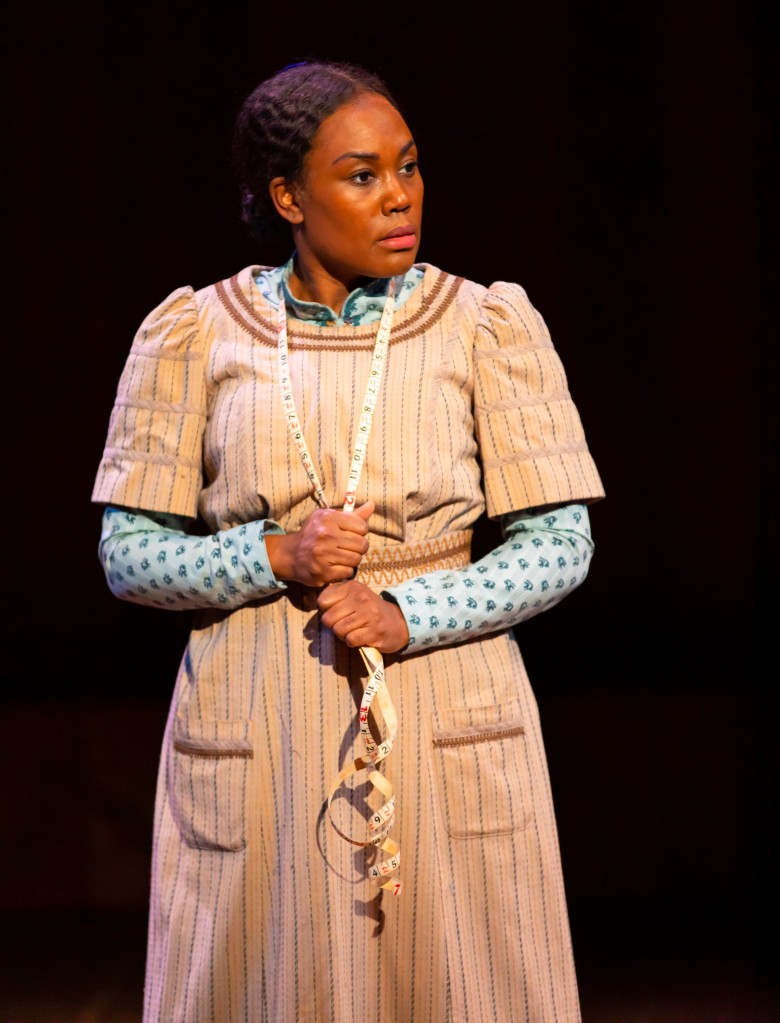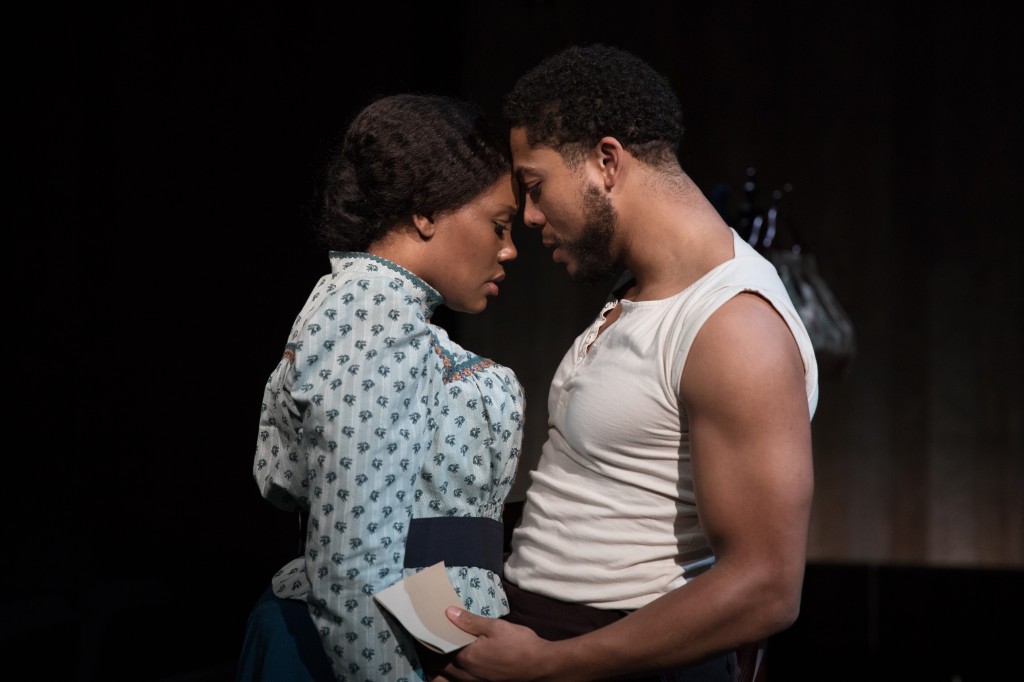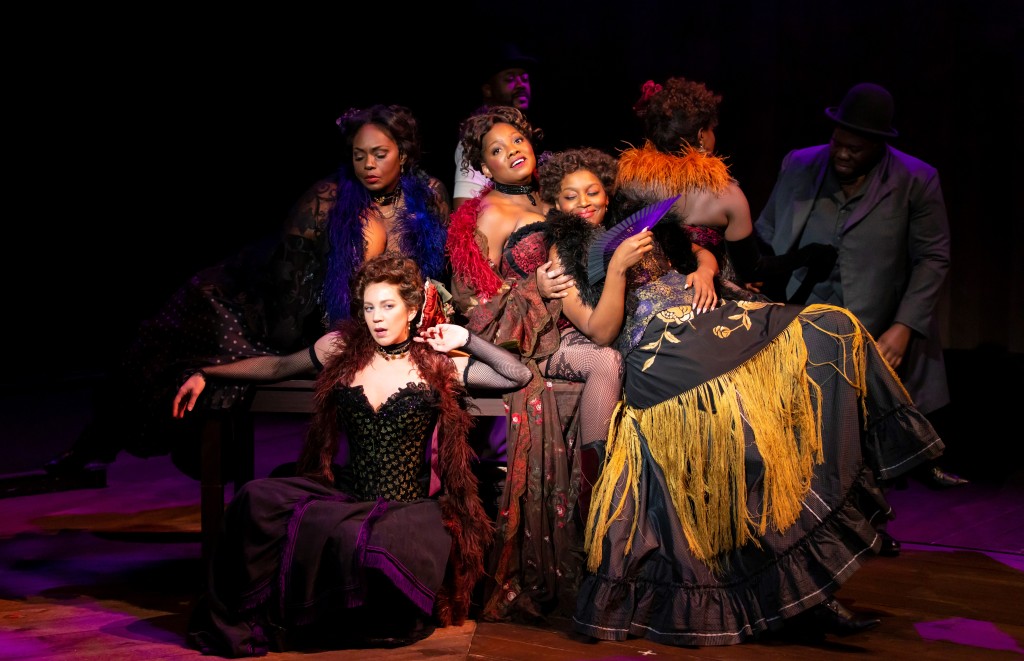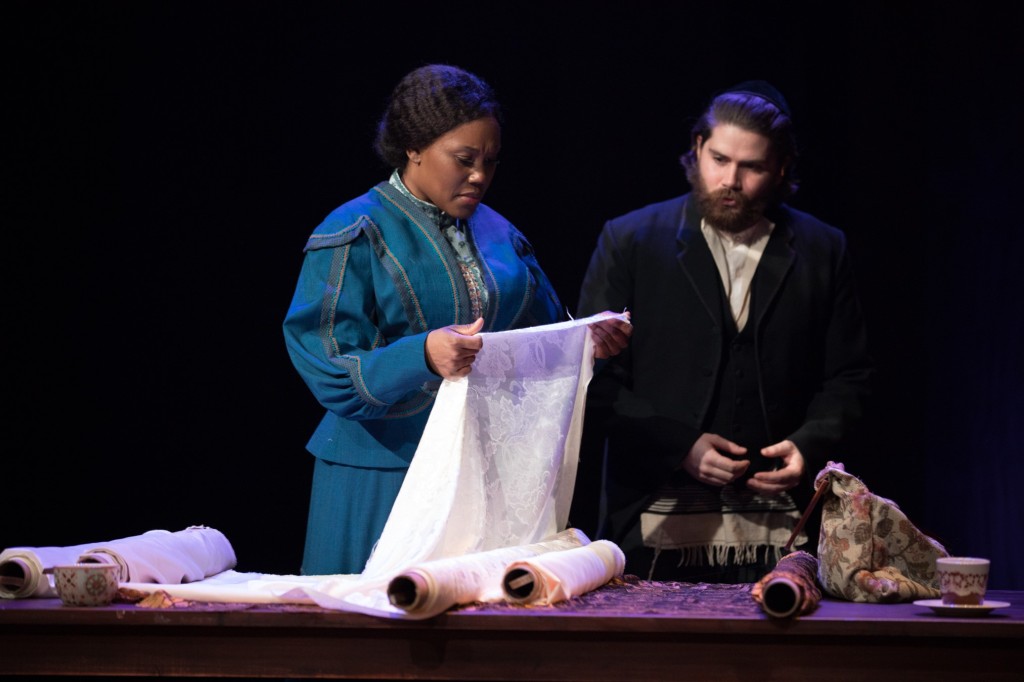‘Intimate Apparel’ a New Opera, a Must-See at Lincoln Center Theater
Posted by caroleditosti

Lynn Nottage’s superb play Intimate Apparel won an Outer Critic’s Circle Award and New York Drama Critic’s Circle Award. It is a play about women circa the turn of the century, the parallels and disparities between race and class, black and white, wealthy and struggling. For the women, gender is the equalizer. This is especially so in Intimate Apparel the opera presented at Lincoln Center’s Mitzi E. Newhouse until the 6th of March. As such this new work is dramatic, taut with undercurrents and themes propelled by Ricky Ian Gordon’s thrilling music and Nottage’s memorable libretto.
Nottage has streamlined her poetic work for Gordon whose music is stylized and hybrid, born out of Nottage’s characterizations to elucidate profound themes that resonate with the audience. Gordon and Nottage are a pairing made in heaven. The production, well thought out by director Bartlett Sher, is all that one might want in raw emotional grace, generated by Gordon’s luscious notes, conveyed by the beautiful, heartfelt voices of the leads and their chorus counterparts.
Sher’s staging features stylized economy and nuance, unencumbered by the extraneous to allow the themes and characterizations to strike with impact. The action takes place on Michael Yeargan’s revolving turntable stage as the world of these characters is circular. The props are efficiently rolled out. Highly specific to the story, they are inconsequential once their purpose has been fulfilled and they dissipate into memory, supplanted by another scene and other props. All reflects an impermanence and hint of symbolic meaning, the tip of the iceberg, like the photographs that appear at the end of each act that Nottage has moved from play to libretto. It is a smashing touch that adheres thematically when we see the floor to ceiling size pictures of the characters “unidentified,” though we have been privileged to have their lives unfold during the opera.
The characters, like us, are subject to their time and place and though they appear to move forward, they remain static, even going backward psychically (George Armstrong, Mayme, Mrs. Van Buran). Forward movement and progress is an illusion, especially for unmarried Negro seamstress, Esther (Kearstin Piper Brown). Nottage effectively draws her arc of development so that Esther is fated to return back to the same setting by the opera’s conclusion. It is in the boarding house of Mrs. Dickson (the superb Adrienne Danrich), when we first meet Brown’s unhappy Esther.

Nottage’s message is clear. Throughout Esther has been through an emotional cataclysm as many black women experienced at the time, marching without notice through history, bearing up against what the society dealt out. Yet, Esther comes through it. And though she ends up in the same place, she is strengthened, stoic, heroic, independent and dignified. Indeed, Esther lands on her feet, perhaps wearily, but she will continue. And it is this delineation of character that Nottage, Sher and Gordon understand in their bones, so that they translate her characterization magnificently into this heartfelt operatic presentation.
From the outset we recognize that Esther is unlike the other women in the boarding house where Corinna Mae’s wedding ceremony is being held. Esther supports herself and is alone, working continually to make her way, not distracted by friends or entertainments which she cannot afford. Thus, she isn’t tempted by the ragtime music that we hear “downstairs.” Throughout, she avoids Mrs. Dickson’s encouragement to meet with one man or another to settle down. Ironically, when she should take Mrs. Dickson’s advice, she doesn’t and pays the price for it.
As the opera opens Esther, annoyed and jealous at Corinna Mae’s marriage, admits to Mrs. Dickson she doesn’t feel she will be loved. Nottage’s libretto melds with Gordon’s party ragtime, as it flows into refrains, “I hate her laughter,” “I hate her happiness.” The libretto throughout is lyrical and grounded in emotional realism as Gordon’s recitative rises to meet the character’s desires and feelings. In this case, Esther yearns to be loved, but feels it is hopeless. But by the end of the scene, she receives a letter given to her from Mrs. Dickson. Perhaps, it will satisfy her longings. Brown’s voice and acting targets our emotions and draws us in to her hopes and concerns. She is wonderful.

The letter is from laborer George Armstrong (Jorell Williams on Sunday matinee when I saw it). From Barbados, working on the Panama Canal, George Armstrong is an acquaintance friend of someone she knows in her church. The letter becomes the driving force of the action in the opera as it is in Nottage’s titular play. Esther, who can’t read or write, solicits help from two of her clients who are literate. Both women, opposite sides of the same coin, make their living from men, unlike Esther. One is the white elite society woman, the wealthy Mrs. Van Buren (the fine Naomi Louisa O’Connell), whose husband supports her in style but who is disassociated from his life emotionally, psychically and physically. The other is Mayme (Tesia Kwarteng on Sunday matinee when I saw it), who sells her sexual favors and takes beatings from the men who pay her for her services, one of which is to abuse her. She, too, is removed from the men to whom she plies her trade in an incredible irony of intimacy.
As Esther sews the same beautifully made “intimate apparel” (calling forth what true intimacy might mean), so they can attract the males in their lives, both help her write the letters to George. Mrs. Van Buren supplies the technical expertise and Mayme supplies the romantic allurements and sugar. During the process Esther becomes their confidante and she becomes theirs. The relationships are enlightening and Nottage reveals the parallels among the women, who the men dominate and abuse emotionally, psychically and physically. Thus, there is no difference between Mrs. Van Buren or Mayme; though the disparities in economic and financial well-being and respect based on race and class are galaxies apart. The women’s scenes with Brown’s Esther and her clients portrayed by O’Connell and Kwarteng are well drawn and ironic, as they move the action forward.
Both “kept women” ply their sexual trade, and though there is the appearance of a vast difference, certainly prompted by women elitists, the women, who are representative of their classes are oppressed. Esther is less so because of her independence and dominant attitude not to embrace the values that keep women enslaved to men. However, Esther, too falls from that grace, and the opera is an affirmation that she must learn that what she has achieved is indomitable and superior to the other women at this time and place.

Ironically, Mrs. Van Buren asks Esther if she is a suffragette when she makes a remark that sounds like women’s empowerment. Esther, in spite of herself, encourages Mrs. Van Buren not to “let him do you that way.” For her part Mrs. Van Buren is stuck in the psyche of her “feminine” class stature. She must fit into the stereotypical cut-outs of elite women. She will be the last to realize the vitality of empowering gender identity and women’s rights. She is her husband’s chattel, dependent on him for support, choosing not to work or seek out a skill which is beneath her. Mayme, like Mrs. Van Buren, is oppressed by the men who pay her. Without a skill to support themselves, Mayme and Mrs. Van Buren are sisters born of the same mother of servitude, soul demeaned without independence.
Esther’s scenes with O’Connell’s Mrs. Van Buren and Kwarteng’s Mayme resonate powerfully. During these scenes especially we understand how the women lure Brown’s Esther (though she has asked for it). Stirred by Mrs. Dickson’s values of a woman’s world defined by a man who keeps her, she and Mayme encourage Esther to “fall in love” with George who is a figment of all their imaginations. This is rendered beautifully in the aria when Mayme and Esther sing about the discovered George who has been with both women. It is then Esther tells Mayme not to let him in the door (symbolizing the door of her heart). “Let him go. He’s an unanswered letter, a feather on the wind, you’ll be chasing him forever.” Brown’s emotional highs and lows tear at our hearts; Nottage’s libretto is poetically striking.
To Mrs. Van Buren Esther represents a freedom and openness she craves in her life. However, the three women sing “I fear I love someone,” a melodic song signifying the love is a symbolic, forbidden creation of their hears and minds. For Esther her forbidden love is Mr. Marks (the wonderfully authentic Arnold Livingston Geis). Marks is the orthodox fabric seller on Orchard Street with whom Brown’s Esther forms a spiritual attachment. For Mrs. Van Buren it is the allure of the forbidden (spoiler alert), Esther who makes her feel accepted and loved for herself. For Mayme it is George’s razzle dazzle manly male, who flashes his money (actually Esther’s money), so they can enjoy themselves. His manipulations have convinced Mayme that he is her “Songbird,” though he is married to Esther.
The love Esther, Mrs. Van Buren and Mayme sing of cannot be purchased; it remains outside of their reach. They are confined by folkways and unable to cross those lines in 1905. Love remains that which is a financial and business arrangement pragmatically as Mrs. Dickson suggests happened in her life. Or it is a fantasy that little girls are taught to dream of to anticipate marriage, which in reality is a bondage, they cannot easily escape after marriage.

Esther’s relationship with Mr. Marks is vibrantly drawn by Nottage’s libretto and sonorously, poignantly brought to life by Brown and Geis. Sensitively, the actors delineate their mystical union, which is limited by folkways. The fabrics Mr. Marks saves for her carry great meaning and sensuality. Their closeness is beyond professional as their glances and smiles reveal they yearn for each other. Just a casual touch is significant. After Esther is married she tells Mr. Marks she can’t see him anymore and her answer when he asks, “Why not?” carries the weight of the world, “I think you know why.”
However, their last meeting occurs when Brown’s Esther gives Geis’ Mr. Marks the smoking jacket that she gave to George, that George gave to Mayme and that Esther took back from Mayme. It is then that we know the value of “intimate apparel,” and how the symbol has final closure. Intimacy isn’t necessarily in a physical acquaintance, it is soulful and spiritual. Esther, who made the jacket on his recommendation tells him, “It was made for you.” His wearing it will have symbolic meaning for him and for her of a love that was never consummated, but a transcendent love that prospers, regardless of nullifying strictures, prejudices and folkways. What a poignant, memorable satisfying moment, superlatively performed by Brown and Geis. Just smashing!
The finely wrought and beautifully designed costumes by Catherine Zuber are characters unto themselves, measuring out the symbolism, conflicts and themes of class, gender and relationships. From lighting (Jennifer Tipton), to sound (Marc Salzberg), to projections (59 Productions), the technical effects are right on, enhancing this exceptional production. Placing the pianos on platforms above the playing area is enlightened, as the music and musicians are integral to the action, driving it, supporting it. Their visibility is dynamic. Kudos to Steven Osgood’s music direction and Dianne McIntyre’s choreography.
Intimate Apparel closes on March 6th unless it is extended which it should be. Though the audience was packed, more individuals need to see this production which hits it out of the ballpark. For tickets and times go to their website https://www.lct.org/shows/intimate-apparel/
About caroleditosti
Carole Di Tosti, Ph.D. is an Entertainment Journalist (Broadway, Off Broadway, Drama Desk voter) novelist, poet and playwright. Carole Di Tosti has over 1800 articles, reviews, sonnets and other online writings, all of which appear on her website: https://caroleditostibooks.com Carole Di Tosti writes for Blogcritics.com, Sandi Durell's Theater Pizzazz and other New York theater websites. Carole Di Tost free-lanced for VERVE and wrote for Technorati for 2 years. Some of the articles are archived. Carole Di Tosti covers premiere film festivals in the NY area:: Tribeca FF, NYFF, DOC NYC, Hamptons IFF, NYJewish FF, Athena FF. She also covered SXSW until 2020. Carole Di Tosti's novel 'Peregrine: The Ceremony of Powers' was released in 2021. Her poetry book 'Light Shifts' was released in 2021. 'The Berglarian,' a comedy in two acts was released in 2023.Posted on March 1, 2022, in Lincoln Center Theater, Theater News, NYC and tagged Bartlett Sher, Intimate Apparel, Lyn Nottage, Naomi Louisa O'Connell, Ricky Ian Gordon. Bookmark the permalink. Leave a comment.
Leave a comment Cancel reply
This site uses Akismet to reduce spam. Learn how your comment data is processed.
Leave a comment
Comments 0